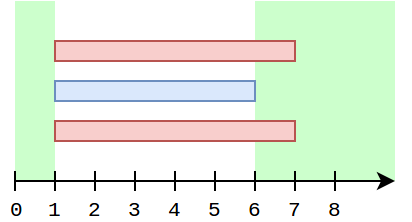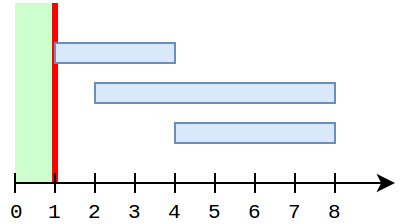Codeforces 833E Caramel Clouds
E. Caramel Clouds

It is well-known that the best decoration for a flower bed in Sweetland are vanilla muffins. Seedlings of this plant need sun to grow up. Slastyona has m seedlings, and the j-th seedling needs at least kj minutes of sunlight to grow up.
Most of the time it's sunny in Sweetland, but sometimes some caramel clouds come, the i-th of which will appear at time moment (minute) li and disappear at time moment ri. Of course, the clouds make shadows, and the seedlings can't grow when there is at least one cloud veiling the sun.
Slastyona wants to grow up her muffins as fast as possible. She has exactly C candies, which is the main currency in Sweetland.
One can dispel any cloud by paying ci candies. However, in order to comply with Sweetland's Department of Meteorology regulations, one can't dispel more than two clouds.
Slastyona hasn't decided yet which of the m seedlings will be planted at the princess' garden, so she needs your help. For each seedling determine the earliest moment it can grow up if Slastyona won't break the law and won't spend more candies than she has. Note that each of the seedlings is considered independently.
The seedlings start to grow at time moment 0.
The first line contains two integers n and C (0 ≤ n ≤ 3·105, 0 ≤ C ≤ 109) – the number of caramel clouds and the number of candies Slastyona has.
The next n lines contain three integers each: li, ri, ci (0 ≤ li < ri ≤ 109, 0 ≤ ci ≤ 109), describing one caramel cloud.
The next line contains single integer m (1 ≤ m ≤ 3·105) – the number of seedlings. Each of the seedlings is described with one integer kj (1 ≤ kj ≤ 109) – the required number of sunny minutes.
For each seedling print one integer – the minimum minute Slastyona can grow it up.
3 5
1 7 1
1 6 2
1 7 1
3
7
2
5
12
7
10
3 15
1 4 17
2 8 6
4 8 9
2
5
1
8
1
2 10
3 7 9
10 90 10
2
10
100
10
104
Consider the first example. For each k it is optimal to dispel clouds 1 and 3. Then the remaining cloud will give shadow on time segment [1..6]. So, intervals [0..1] and [6..inf) are sunny.

In the second example for k = 1 it is not necessary to dispel anything, and for k = 5 the best strategy is to dispel clouds 2 and 3. This adds an additional sunny segment [4..8], which together with [0..1] allows to grow up the muffin at the eight minute.


If the third example the two seedlings are completely different. For the first one it is necessary to dispel cloud 1 and obtain a sunny segment [0..10]. However, the same strategy gives answer 180 for the second seedling. Instead, we can dispel cloud 2, to make segments [0..3] and [7..inf) sunny, and this allows up to shorten the time to 104.
题目链接:http://codeforces.com/problemset/problem/833/E
叉姐的题解:

叉姐的代码:
1 #include <algorithm> 2 #include <cstdio> 3 #include <cstring> 4 #include <map> 5 #include <set> 6 #include <utility> 7 #include <vector> 8 9 const int N = 300000; 10 11 struct Sum 12 { 13 int add(int id, int value) 14 { 15 if (a[0].second == id) { 16 a[0].first = std::max(a[0].first, value); 17 } else if (a[1].first < value) { 18 a[1] = {value, id}; 19 } 20 if (a[0].first < a[1].first) { 21 std::swap(a[0], a[1]); 22 } 23 } 24 25 int ask(int id) 26 { 27 if (a[0].second != id) { 28 return a[0].first; 29 } 30 return a[1].first; 31 } 32 33 std::pair<int, int> a[2] = {{0, -1}, {0, -1}}; 34 }; 35 36 int cost[N + 1], toupd[N]; 37 38 int main() 39 { 40 #ifdef LOCAL_JUDGE 41 freopen("E.in", "r", stdin); 42 #endif 43 int n, budget; 44 while (scanf("%d%d", &n, &budget) == 2) { 45 cost[n] = 0; 46 std::vector<std::pair<int, int>> events; 47 events.emplace_back(0, n); 48 events.emplace_back(2000000000, n); 49 for (int i = 0, l, r; i < n; ++ i) { 50 scanf("%d%d%d", &l, &r, cost + i); 51 events.emplace_back(l, i); 52 events.emplace_back(r, i); 53 } 54 std::sort(events.begin(), events.end()); 55 std::vector<int> values(cost, cost + n); 56 std::sort(values.begin(), values.end()); 57 values.erase(std::unique(values.begin(), values.end()), values.end()); 58 std::set<int> covers; 59 if (events[0].second < n) { 60 covers.insert(events[0].second); 61 } 62 int curmx = 0; 63 std::vector<std::pair<int, int>> parts; 64 memset(toupd, 0, sizeof(toupd)); 65 std::vector<Sum> bit(values.size()); 66 std::map<std::pair<int, int>, int> length; 67 for (int t = 1; t < (int)events.size(); ++ t) { 68 int mxlen = events[t].first - events[t - 1].first; 69 if (mxlen > 0 && (int)covers.size() <= 2) { 70 int p = n, q = n; 71 if ((int)covers.size() > 0) { 72 p = *covers.begin(); 73 } 74 if ((int)covers.size() > 1) { 75 q = *covers.rbegin(); 76 } 77 int start = -1; 78 if (p == n) { // 0 79 start = curmx; 80 } else { 81 if (q == n) { // 1 82 if (cost[p] <= budget) { 83 start = toupd[p]; 84 for (int k = (int)(std::upper_bound(values.begin(), values.end(), budget - cost[p]) - values.begin()) - 1; k >= 0; k -= ~k & k + 1) { 85 start = std::max(start, bit[k].ask(p)); 86 } 87 auto value = length[{p, q}] + mxlen; 88 for (int k = std::lower_bound(values.begin(), values.end(), cost[p]) - values.begin(); k < (int)values.size(); k += ~k & k + 1) { 89 bit[k].add(p, value); 90 } 91 } 92 } else if (cost[p] + cost[q] <= budget) { 93 start = length[{p, n}] + length[{q, n}]; 94 toupd[p] = std::max(toupd[p], length[{q, n}] + length[{p, q}] + mxlen); 95 toupd[q] = std::max(toupd[q], length[{p, n}] + length[{p, q}] + mxlen); 96 } 97 if (~start) { 98 start += length[{p, q}] + length[{n, n}]; 99 } 100 } 101 if (~start && start + mxlen > curmx) { 102 curmx = start + mxlen; 103 parts.emplace_back(curmx, events[t].first); 104 } 105 length[{p, q}] += mxlen; 106 } 107 auto&& i = events[t].second; 108 if (i < n) { 109 if (covers.count(i)) { 110 covers.erase(i); 111 } else { 112 covers.insert(i); 113 } 114 } 115 } 116 int q, t; 117 scanf("%d", &q); 118 while (q --) { 119 scanf("%d", &t); 120 auto it = std::lower_bound(parts.begin(), parts.end(), std::make_pair(t, 0)); 121 printf("%d\n", it->second - (it->first - t)); 122 } 123 } 124 }
作 者:Angel_Kitty
出 处:https://www.cnblogs.com/ECJTUACM-873284962/
关于作者:阿里云ACE,目前主要研究方向是Web安全漏洞以及反序列化。如有问题或建议,请多多赐教!
版权声明:本文版权归作者和博客园共有,欢迎转载,但未经作者同意必须保留此段声明,且在文章页面明显位置给出原文链接。
特此声明:所有评论和私信都会在第一时间回复。也欢迎园子的大大们指正错误,共同进步。或者直接私信我
声援博主:如果您觉得文章对您有帮助,可以点击文章右下角【推荐】一下。您的鼓励是作者坚持原创和持续写作的最大动力!
欢迎大家关注我的微信公众号IT老实人(IThonest),如果您觉得文章对您有很大的帮助,您可以考虑赏博主一杯咖啡以资鼓励,您的肯定将是我最大的动力。thx.

我的公众号是IT老实人(IThonest),一个有故事的公众号,欢迎大家来这里讨论,共同进步,不断学习才能不断进步。扫下面的二维码或者收藏下面的二维码关注吧(长按下面的二维码图片、并选择识别图中的二维码),个人QQ和微信的二维码也已给出,扫描下面👇的二维码一起来讨论吧!!!

欢迎大家关注我的Github,一些文章的备份和平常做的一些项目会存放在这里。


















【推荐】国内首个AI IDE,深度理解中文开发场景,立即下载体验Trae
【推荐】编程新体验,更懂你的AI,立即体验豆包MarsCode编程助手
【推荐】抖音旗下AI助手豆包,你的智能百科全书,全免费不限次数
【推荐】轻量又高性能的 SSH 工具 IShell:AI 加持,快人一步
· 如何编写易于单元测试的代码
· 10年+ .NET Coder 心语,封装的思维:从隐藏、稳定开始理解其本质意义
· .NET Core 中如何实现缓存的预热?
· 从 HTTP 原因短语缺失研究 HTTP/2 和 HTTP/3 的设计差异
· AI与.NET技术实操系列:向量存储与相似性搜索在 .NET 中的实现
· 周边上新:园子的第一款马克杯温暖上架
· Open-Sora 2.0 重磅开源!
· 分享 3 个 .NET 开源的文件压缩处理库,助力快速实现文件压缩解压功能!
· Ollama——大语言模型本地部署的极速利器
· [AI/GPT/综述] AI Agent的设计模式综述